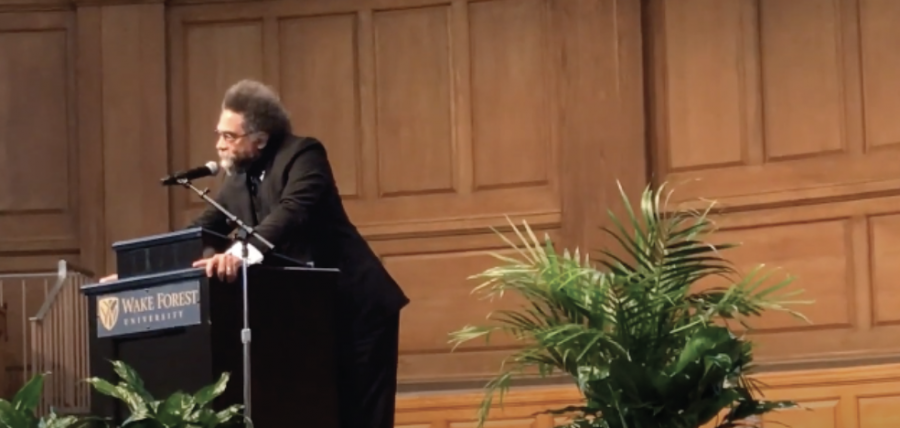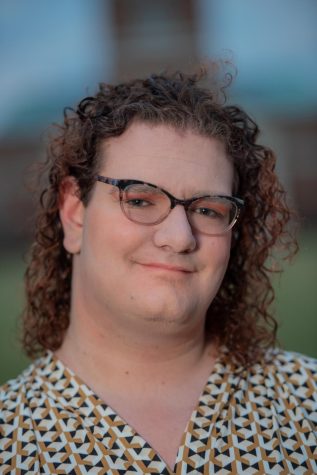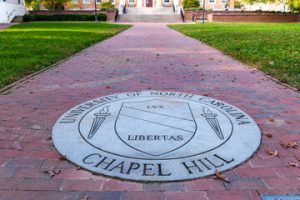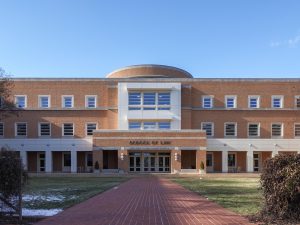Cornel West speaks on campus
The prominent scholar and activist spoke at two events: a lecture and a symposium about his book
Renowned activist and scholar Cornel West speaks to Wake Forest students and community members in a Wait Chapel lecture on Nov. 4. West spoke on the importance of love and humanity.
November 11, 2021
On Nov. 4 and 5, renowned scholar and activist Cornel West came to Wake Forest’s campus to speak to students and community members.
On Nov. 4, West delivered a lecture to Wake Forest community members in Wait Chapel. On Nov. 5, West spoke with professors from across the nation about his book, “Prophecy Deliverance!” — which came out in 1982 — in the Broyhill Auditorium. The events were sponsored by the Divinity School’s Mac Bryan Prophetic Teaching Series and the African American Studies Program.
“The Mac Bryan Prophetic Preaching Series is among the annual signature events of the School of Divinity,” Dean of the Divinity School Jonathan Lee Walton said in a Wake Forest press release.
Walton continued: “It has allowed us to host some of the premier progressive preachers and public intellectuals on the planet. As a philosopher, author and social justice warrior, Dr. Cornel West typifies the spirit of the Mac Bryan Series.”
Students, including senior Caroline Arkalji, who attended the lecture on Nov. 4, were quite impressed by West.
“The ideas I found most interesting were about this moment of spiritual decay that the United States and the world currently going through,” Arkalji said. “And how in a world where we are surrounded by anxiety and hostility, justice is what love looks like in a public space.”
Arkalji was also impressed with West’s ability to inspire the audience.
“He captivated everyone with his amazing words on topics surrounding race, religion and spirituality,” Arkalji said. “His words were somehow comforting, but they also inspired me to think more about myself and my spirituality.”
Sophomore Hasan Pyrali, who attended both events, shared Arkalji’s views.
“I think everyone left the room feeling smarter and better,” Pyrali said.
Pyrali also noted that West’s perspective on Christianity and religion was one he had never heard before.
“I’ve never seen religion being so expressly used as a force for good,” Pyrali said. “It’s been used as a means for exclusion or condemnation or some type of judgment. I’ve heard a lot of my religion says this, and this is why you are bad. I have not heard a lot of ‘my religion says this, and this is why you are good.”
Overall, Pyrali said that West’s message of acceptance and his appeals to our common humanity resonated with him.
“We live on a campus, and really in a society, where there’s always tests that people run on each other, whether it be religious tests or cultural tests or political tests,” Pyrali said. “And usually, those tests determine whether people see each other as human without actually talking to those people.”
Especially at a Predominantly White Institution like Wake Forest, West’s viewpoints provide a perspective that the majority of the Wake Forest community may not be familiar with.
“I think it’s very important for Wake Forest to bring influential speakers – particularly those who are of color, such as Cornel West – on campus,” sophomore Karina Rotimi, who attended a Nov. 5 luncheon that featured West, said. “And it’s important to give students the opportunity to listen to them speak and attend those events.”
Sophomore Nia Thompson said West offered insight into navigating a world mired in racism and injustice.
“West explains how in the face of the most vicious oppression and subjugation, black people have remained love warriors who exhibit a gentle tenderness,” Thompson said.
Thompson continued: “I think this speaks to a larger point about nihilism and pessimism. While those two things may not be unwarranted, Dr. West places an emphasis on retaining love and passing tenderness onto one another so we do not lose ourselves and our humanity in these vicious institutions.”
Arkajli believes it is important to bring speakers like West into the Wake Forest bubble.
“For me, it is essential … it’s a way of stimulating the ideas of the community,” Arkajli said.
Pyrali agreed, but he cautioned that prominence does not equal value.
“I would say having progressive and intellectual speakers matters a lot more…,” Pyrali said. “I think having someone like Cornel West … was a good choice.”















